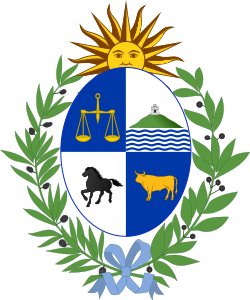 |
|---|
Parliamentary elections were held in Uruguay on 26 November 1901 to elect all members of the Chamber of Representatives. [1] [2]
 |
|---|
Parliamentary elections were held in Uruguay on 26 November 1901 to elect all members of the Chamber of Representatives. [1] [2]
Suffrage was limited to literate men. Voting was not secret, as voters had to sign their ballot paper. [3]
Results excludes vote figures from Colonia, Florida and Durazno.
 | ||||
|---|---|---|---|---|
| Party | Votes | % | Seats | |
| Colorado Party | 15,268 | 54.95 | 42 | |
| National Party | 12,516 | 45.05 | 25 | |
| Total | 27,784 | 100.00 | 67 | |
| Source: Bottinelli et al [1] and Madrid. [2] | ||||